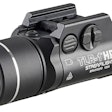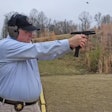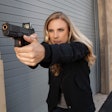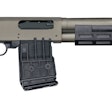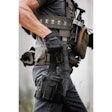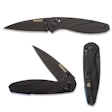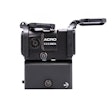The 99-50 vote followed a debate that focused more on the conduct of the 1999 referendum on concealed weapons than on the issue itself. With only weeks left in the session, the bill goes to the Senate, where it faces stronger opposition.
This week, a Senate committee stripped concealed weapons provisions out of related legislation.
Gov. Bob Holden has said he would veto a concealed weapons bill if it reached his desk.
Some members who voted for the concealed weapons bill represent areas where voters defeated the issue three years ago. The lawmakers defended their "yes" votes by saying either that the mood of the voters had changed or that the bill before them was different.
Rep. Richard Byrd, R-Kirkwood, said that while his area had opposed concealed weapons, the bill the House considered required more training for permit holders, more restrictions on where the guns could be carried, and better background checks.
Rep. Wayne Crump, D-Potosi and a supporter of the 1999 proposal, said the ballot language explaining it had been rewritten by courts in such a way as to discourage support at the polls. He said a cost estimate drafted by Auditor Claire McCaskill exaggerated the legislation's price tag.
The National Rifle Association spent nearly $4 million in the unsuccessful attempt to pass the referendum. The NRA outspent opponents by more than 4-to-1. Missouri voters rejected concealed weapons 52 percent to 48 percent.
This year's measure will not be placed on the ballot.
Rep. Kathlyn Fares, R-Webster Groves, represents an area that voted against the referendum. She said the voters were neither led nor misled.
"This is a public health issue," Fares said. "People knew what they were voting on. We do know how to read. We did it because that was our feeling."
Rep. Barbara Fraser, D-University City, said the House bill had problems because it permitted people to carry a gun in church and allowed those who had been convicted of domestic violence to qualify for a permit.
Under the bill, applicants would have to pass a sheriff's background check and complete a firearms safety course. A sheriff could deny a permit to someone who has been found guilty of a crime that is punishable by a prison sentence of more than a year. People found to be mentally incompetent at the time of application or for five years before applying are also disqualified.
Controllers of public buildings and owners of private facilities may prohibit people from carrying concealed weapons in the structures. These include courthouses, government meeting rooms, airports, bars, schools, hospitals, stadiums, and amusement parks. However, licensed public officials may bring them into these buildings.
Concealed weapons proponents have said the strong House showing should help the bill in the Senate. Recently, when the Senate Judiciary Committee considered a House-passed bill allowing concealed weapons in cars, the Second Amendment Coalition's Greg Jeffery recommended the committee change the bill to become "full-fledged" conceal and carry. Jeffery said 33 other states had such a law and there was proof that it was not a problem.
Stacey Newman of the Million Mom March said concealed weapons would increase children's access to firearms and result in more deaths and injuries from gun accidents.
Before the Senate committee approved the bill, it eliminated all concealed weapons provisions. The bill now relates only to federal firearms violations.
The bills are HB 1729 and HB 1344.








